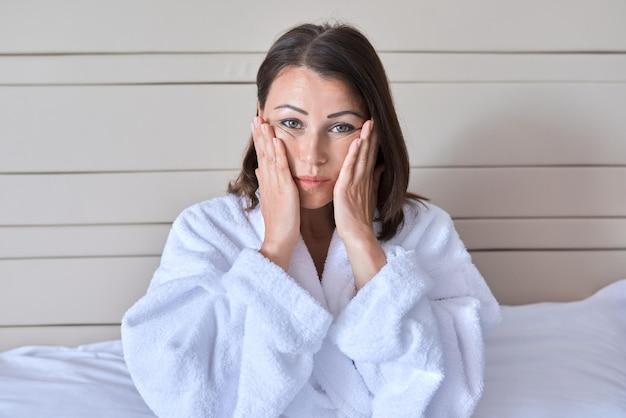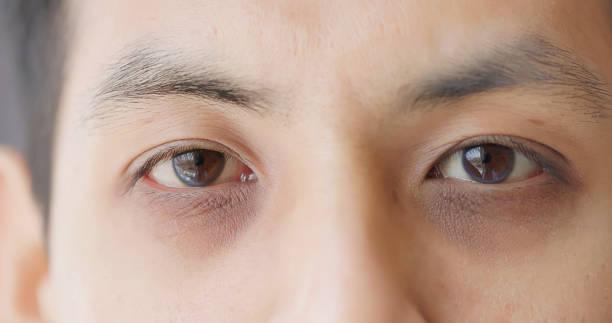Waking up with puffy eyes is a common annoyance for many. These bags or swellings underneath the eyes may leave individuals feeling self-conscious and uncomfortable. Often, this condition is harmless and can be attributed to factors such as lack of sleep, allergies, or even genetics. But what does it truly signify when you find yourself repeatedly waking up to puffy eyes, and are there ways to remedy this? This article seeks to demystify the causes of under-eye puffiness and explore practical solutions to prevent and reduce the occurrence of puffy eyes upon waking.
Decoding The Signs: What Puffy Eyes Reveal About Your Health

Puffy eyes might not only be a sign of a restless night but can also be indicative of your overall health. While these transient changes in appearance can result from a high-salt dinner or a bout of tears, they might also point to sleep quality and underlying health conditions. For some, under-eye puffiness is the body’s response to allergies or a reflection of habits such as excessive screen time or high caffeine intake. Understanding the underlying causes is the first step towards finding a viable solution.
The Role of Sleep in Eye Health
Achieving a good night’s sleep is critical for eye health. Inadequate sleep can disrupt the body’s ability to regulate fluid, leading to puffiness. The position in which you sleep can also contribute to this condition; for instance, sleeping on your stomach can encourage fluid to accumulate under the eyes. Sleep-related disorders, such as sleep apnea, are notorious for causing puffiness due to interrupted breathing patterns, stale air in the bedroom, and poor sleep quality, hence affecting the eyes.
External Factors Contributing to Morning Puffiness

The environment plays a significant role in the health of our eyes. Pollen, dust, and pet dander are all common allergens that can lead to puffy eyes upon waking. Beyond allergies, the types of foods and beverages consumed can influence puffiness. Diets high in sodium, for example, can cause the body to retain water, resulting in swollen tissues around the eyes.
Fluid retention, medically referred to as edema, is typically the culprit behind puffy eyes. This physiological phenomenon can be the result of changes in weather, hormone levels, or blood flow. However, some people may have a genetic predisposition that makes them more susceptible to this condition. By understanding the science, individuals can better identify the contributing factors and take preventive measures.
Effective Home Remedies and Treatments for Puffy Eyes
Simple home remedies often suffice in reducing the appearance of puffy eyes. Cold compresses and chilled cucumber slices are traditional methods that help constrict blood vessels and decrease swelling. Hydrating the body with plenty of water and consuming herbal teas may also facilitate the reduction of puffiness by promoting a detoxifying effect.
Here are some natural remedies you can try:
- Cold Spoon Compress: Place a pair of metal spoons in the fridge before you sleep and gently press them against your eyes in the morning.
- Green Tea Bags: Steep two bags of green tea and let them cool in the fridge overnight. Place them on your eyes to benefit from the tea’s anti-inflammatory properties.
Skincare Products and Techniques for Reducing Puffiness
In addition to home remedies, there are various skincare products available to alleviate under-eye puffiness. Look for eye creams containing ingredients like caffeine, which can stimulate circulation and reduce swelling. Remember to apply these products with gentle patting motions rather than rubbing, which can aggravate the delicate under-eye area.
Here is a breakdown of ingredients often found in anti-puffiness eye creams:
| Ingredient | Properties | Benefits |
|---|---|---|
| Caffeine | Vasoconstrictor | Reduces swelling by constricting blood vessels |
| Retinol | Anti-aging | Promotes skin cell turnover and collagen production |
| Hyaluronic Acid | Humectant | Attracts and retains moisture in the skin |
| Vitamin C | Antioxidant | Helps to brighten the skin and combat dark circles |
When to Seek Professional Help for Puffy Eyes
Most instances of puffy eyes are temporary and can easily be treated with home remedies or lifestyle changes. However, if the puffiness is prolonged, severe, or accompanied by additional symptoms such as pain or changes in vision, it’s important to consult a healthcare professional. They can rule out conditions like thyroid issues, infections, or other medical concerns that require specialized treatment.
To maintain the condition of your eyes, prevention is key. Here are measures to integrate into your daily routine:
- Maintain a balanced diet low in sodium to minimize water retention.
- Ensure good sleep hygiene by establishing a regular sleep schedule and a comfortable sleep environment.
Conclusion: Embracing a Holistic Approach to Prevent Puffy Eyes
Puffy eyes, while a common challenge, can frequently signal the need for a more attentive self-care routine. Understanding the causes, whether they be sleep disturbances, allergies, or dietary choices, can lead to effective treatment and prevention strategies. Emphasizing natural remedies, proper skincare, and an overall balanced lifestyle can keep under-eye puffiness at bay. By adopting a holistic approach to your health and skincare regimen, you can minimize the occurrence of waking up with puffy eyes.
FAQs about Puffy Eyes Upon Waking
Q1: Can dehydration cause puffy eyes in the morning?
A1: Yes, dehydration can lead to fluid retention, causing the body to hold onto water and potentially resulting in puffiness around the eyes upon waking.
Q2: Are there specific sleeping positions recommended to prevent puffy eyes?
A2: Sleeping on your back with your head slightly elevated can help reduce the chances of fluid accumulation under the eyes during the night.
Q3: Could my makeup removal routine be contributing to my puffy eyes?
A3: Yes, if makeup is not thoroughly removed before sleep, it can irritate the eyes and lead to inflammation and puffiness. It is essential to gently remove all makeup and cleanse your face before bedtime.
Q4: Is it normal for my eyes to be puffier during certain times of the year?
A4: Seasonal allergies can cause the eyes to become puffier during peak allergy seasons due to increased histamine production and subsequent inflammation.
Q5: At what point should I be concerned about my puffy eyes?
A5: If puffiness is severe, persistent, accompanied by pain, or if there are other symptoms like vision changes, it is critical to seek medical advice, as it could indicate an underlying health issue.
